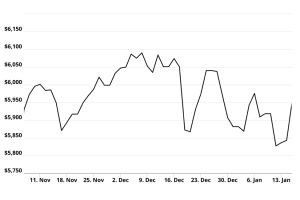
The subscription economy is revolutionizing business models, fostering an environment where companies thrive on predictable, high-margin revenues. This innovative approach has seen a meteoric rise in recent years. Increasingly, enterprises globally are embracing this shift, looking to substantially improve their financial health and stabilize their top-line growth.
Forecasts suggest the market could potentially reach a whopping size of $1.5 trillion by 2025, underscoring its immense growth potential. In addition to this model boosting revenue predictability, it also reduces customer churn, overall improving margins. For investors, this strategy promises not just immediate returns but substantial long-term growth.
With that in mind, let’s delve into the top three stocks primed to play a pivotal role in the ascendance of the subscription economy.
Netflix (NFLX)

Netflix (NASDAQ:NFLX) is arguably a pioneer in the streaming sphere that has effectively revolutionized the digital media landscape. Boasting over 247 million global subscribers, the platform offers an array of films, documentaries, and hit shows including The Witcher and Squid Game. This diverse content range not only attracts new users but also ensures the loyalty of existing ones.
In its third-quarter earnings, Netflix reported an astounding revenue of $18.12 billion, an eye-watering 205.6% bump compared to the previous year. Remarkably, efforts to curb password sharing have led to unprecedented subscriber growth, particularly in the U.S. and Canada with a 1,583% surge and in Europe, the Middle East, and Africa with a 596% upswing. These figures reflect the company’s successful strategy in expanding its user base.
Furthermore, Netflix is aggressively expanding its advertising business, which promises to be a significant revenue driver. This move, combined with its compelling content, positions Netflix for sustained growth, making it a focal point for investor attention. If you’re looking to make the most of the subscription economy, this is a clear entry point.
Spotify (SPOT)

Spotify Technology (NYSE: SPOT) stands as a titan in the audio streaming industry. With a robust user base of 574 million monthly active listeners, of which 226 million are premium subscribers, the platform’s success is driven by its comprehensive music and podcast offerings.
In its third-quarter earnings for 2023, Spotify reported a noteworthy 11% year-over-year increase in total revenue. The company remarkably flipped the script with its most recent financials, from a net loss of €166 million in the third quarter of 2022 to a net gain of a staggering €65 million recently. Growth was evident in both the premium subscription revenue and ad-supported segments with 10% and 16% increases, respectively, highlighting the efficacy of its diverse revenue streams.
Spotify’s financial rebound has resonated with investors, with its share price surging by 143% this year. This increase, spurred by enhanced profitability and consistent subscription renewals, has further boosted investor confidence, positioning Spotify for continued success in the competitive streaming market.
Disney (DIS)

In 2020, Disney (NYSE: DIS) faced significant challenges due to the pandemic’s impact on its theme parks and cruise lines. Despite these hurdles, the entertainment giant is making a strong comeback, evidenced by a 5.5% year-to-date growth in its stock. This uptick signals a renewed investor confidence in Disney, showcasing its resilience and potential for recovery.
Financially, the company reported revenue of $21.24 billion and adjusted earnings of 82 cents per share, surpassing expectations of 71 cents. Moreover, Disney’s strategic move to cut an extra $2 billion in costs, resulting in $7.5 billion in total savings this year, highlights its commitment to fiscal efficiency.
Additionally, Disney’s successful pivot to streaming is evident with Disney+, adding 7 million new subscribers, reaching 150.2 million in total. Offering a diverse array of content from animated classics to Marvel and Star Wars, the platform is a key player in Disney’s strategy. Focused on achieving profitability in its direct-to-consumer segment by the end of fiscal 2024, Disney is poised for sustained growth.
On the date of publication, Muslim Farooque did not have (either directly or indirectly) any positions in the securities mentioned in this article. The opinions expressed in this article are those of the writer, subject to the InvestorPlace.com Publishing Guidelines




